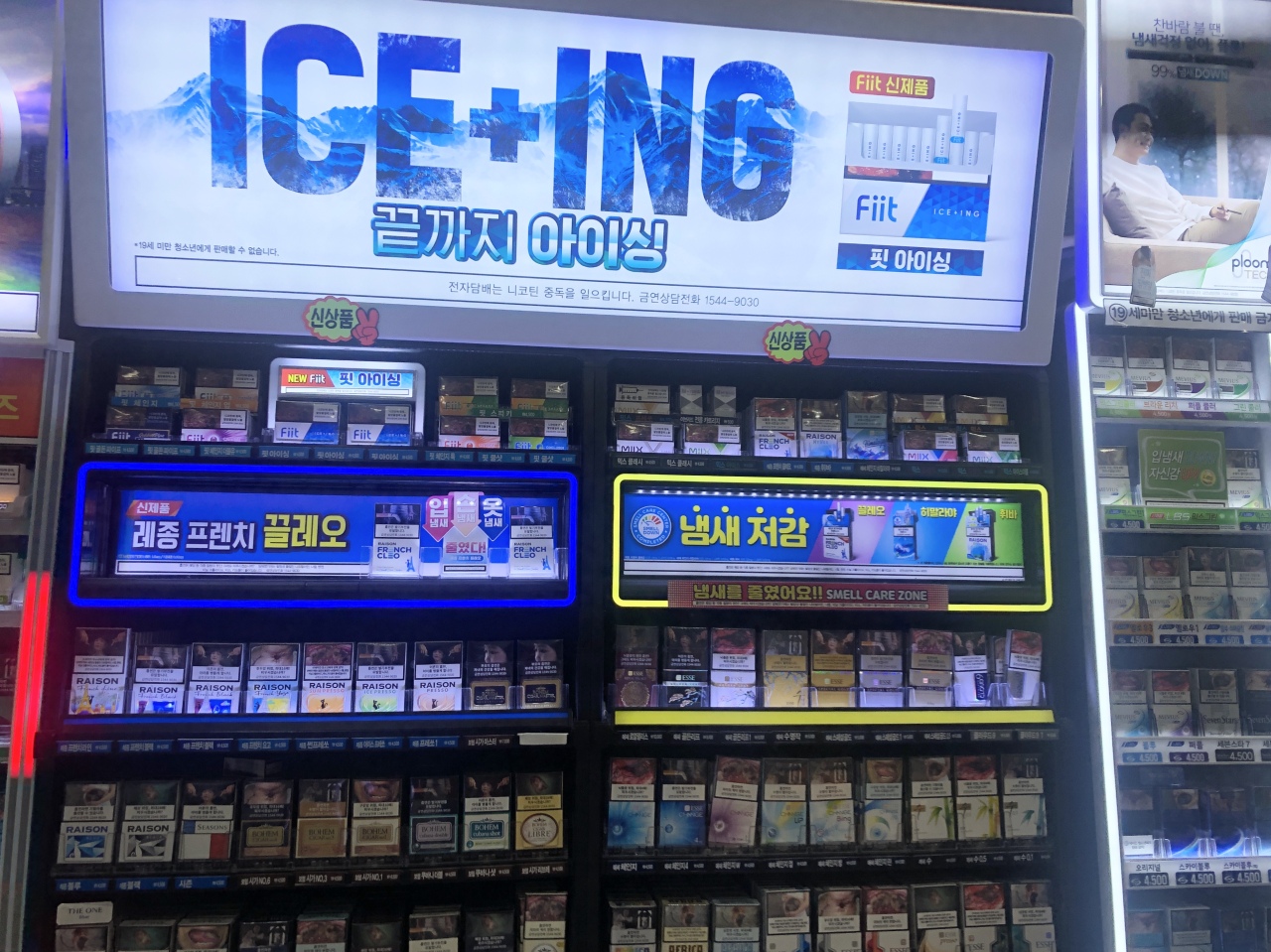[Feature] Smokers ditch smells but not habit
Korea, with one of the highest smoking rates, shows surge in heating-type cigs consumption
By Jo He-rimPublished : June 1, 2020 - 11:06

Lee Hae-kyun, an office worker in Seoul smokes heat-not-burn e-cigarettes because he is often nauseated by the strong smell of conventional tobacco products.
“I have smoked conventional cigarettes for a long time, and still do smoke them occasionally. But turned to Iqos mainly because of the smell,” Lee, 34, told The Korea Herald.
“Nonsmokers often think smokers are oblivious to the odor, but many of us find it unpleasant just the same.”
Ko Eun-seok, not his real name, said he has turned to e-cigarettes because he owns a car.
“Anyone with a car and smokes would know how easily the stale cigarette odor infiltrates the space inside. I did not like it and neither did my family, so I had to change,” Ko, 50, told The Korea Herald.
“Besides it has become social etiquette to think about others when smoking. People do not like smokers moving around spreading the smell.”
Since 2017 when Philip Morris International introduced Iqos, an HNB-type e-cigarette, in Korea, the number of similar types of products launched by other companies has more than quadrupled.
Sales of the heating-based type cigarettes increased from 79 million 20-cigarette packs in 2017 to 360 million in 2019, accounting for 9.6 percent of the whole cigarette market last year. The market portion is second after Japan, where e-cigarette sales took up about 22 percent of its domestic market last year.
Korea has one of the highest smoking rates of male adults around the world, recording 38.1 percent in 2017, and the total tobacco market has been valued at 18.4 trillion won ($15.6 billion) as of last year.
One of the reasons for such a steep growth of the heating tobacco market in Korea is attributed to the enhanced campaign against second-hand smoking, tendency to be conscious of how one is perceived and lack of smoking space -- since the reinforced regulations that restrict smoking in public buildings and surrounding areas.
In a multiple-choice survey conducted by the Ministry of Health and Welfare and University of Ulsan last year, more than 77.9 percent of heating cigarette smokers said they changed to e-cigarettes due to the smell. Some 57.6 percent said because it seemed to reduce second-hand smoke. Among other reasons, 45.9 percent said they were influenced by the looks of the devices, and 38.4 percent said it helps in quitting the habit.

Less smelly cigarettes
To satisfy the susceptible consumer market, some tobacco companies here have rolled out conventional cigarette products with “reduced smell,” by applying special technologies on the sidelines of their odorless e-cigarette promotions.
“One of the notable changes in trend seen last year was the rise in popularity of cigarette products with less odor, largely created by the expansion of e-cigarette brands, as it raised preference among people to smoke with less smell,” an official from KT&G, South Korea’s tobacco giant, told The Korea Herald.
Recognizing the special preference of Korean consumers in their sensitivity to smell, KT&G rolled out its first odor-reduced cigarette product, Esse Change Himalaya, in April 2019 using “smell-reducing technology.”
The item sold over 10 million 20-cigarette packs (in convenience stores) in four months after release, and recorded total sales of 24 million packs in 2019. It takes about 14 months for a new product to sell 10 million packs on average, KT&G explained.
The company also established “Smell Care Center” at its research institute in September, coming up with “Triple Care System” and launched Raison French Cleo in November, which has been developed to cut the smell of a burning cigarette in the breath, fingers and clothes of the user, the company said.
While the company said it cannot disclose the details of its individual technology, it said it uses materials specially developed such as “smoke-reducing rolling paper” and has applied for a patent.
On May 20, KT&G presented Esse Change Frozen, the fifth product in its smell-cutting cigarette line, which the company explains has applied “Smell Care” technology to reduce the breath smell after smoking.
The pioneer in smell-reducing cigarettes is Japan Tobacco, which introduced Less Smoking Smell product, Mild Seven LSS One in 2007; the product series changed its name to Mevius in 2013.
According to JT International, its LSS product used a unique technology to reduce the smell of smoke in the air.
Eleven years later, JTI launched a new line of Less Breath Smell product, Mevius LBS in September 2019, which, according to the company, reduces the smell of cigarette inside the mouth.
As for LBS products, JTI Korea said it currently has seven different LBS products in the market, including Mevius LBS Yellow Superslim 1mg launched on March 9.
As for the “steamy odor” of HNB-type e-cigarettes that users here have complained about, companies have come up with new technologies to reduce it as well.
While the heating-type e-cigarettes significantly reduced the classic cigarette smell by “steaming” the tobacco sticks to around 300 degrees Celsius to avoid the usual combustion, the tobacco vapor it emits has been called as the culprit of the unique, steamy odor by sensitive users.
Over this, companies say the distinct smell of vapor has also been reduced significantly since its first introduction. Hybrid HNB e-cigarettes are one of them, as the device heats liquid without nicotine to create vapor, which passes through the tobacco leaves and delivers the infused vapor to users.
KT&G introduced lil hybrid product in November 2018, and JTI, with its Ploom Tech in July 2019. British American Tobacco Korea also released Glo Sens in August 2019, introducing the company’s new hybrid product for the first time in South Korea.
Such efforts to reduce odor in conventional cigarettes appear to be limited to KT&G and JT though, industry observers point out, as others say their focus is strong on e-cigarettes.

Still, this reflects how Koreans and Japanese smokers share similar tastes in choosing cigarettes, and also a notable difference with consumers in other parts of the world.
“Smell is a common factor between the two customer groups, but it is also a dividing factor, as Japanese customers largely appear to be more concerned about causing others inconvenience with their cigarette smells,” JTI Korea official told The Korea Herald.
Will it sell globally?
Industry officials say the conventional cigarettes with less odor sold in Korea could gain popularity in other parts of the world, but the attention is more likely to rise on heating-based e-cigarette products.
“Smokers in Europe, Middle East and South East Asia, for example, appear to prefer strong cigarettes, and their concerns are relatively more focused on the harmful effects,” an industry official said.
Still, JTI is considering plans to expand its sales of Mevius LBS lines -- which are only sold in Korea now -- in other countries.
KT&G is yet to set specific plans to export the less-odor conventional cigarette products, as the level of awareness on cigarette smell shows gaps among different countries.
The market for the less smelly heated e-cigarettes is expected to grow, as the world’s leading tobacco companies are competitively introducing new product lines.
Market analysts predict the world market for the heating-type cigarettes to see a compounded annual growth rate of about 26 percent in the next four years. Euromonitor International also anticipated the size of Korean market to grow 21 percent annually to reach $5.2 billion in 2023.
The world’s No. 1 tobacco maker by sales, PMI had announced its commitment to creating a “smoke-free future,” transitioning its direction from conventional cigarettes to e-cigarettes.
In January, PMI and KT&G in a rare move joined hands. Under their partnership deal, PMI will distribute the Korean company’s brand lil in overseas markets.
PMI also received four awards in the One Planet Award program for its achievements in delivering a smoke-free future, according to the company on Thursday. The program, hosted by Silicon Valley Communications, is an initiative acknowledging business and professional excellence in the industries around the world.
By Jo He-rim (herim@heraldcorp.com)







![[Hello India] Hyundai Motor vows to boost 'clean mobility' in India](http://res.heraldm.com/phpwas/restmb_idxmake.php?idx=644&simg=/content/image/2024/04/25/20240425050672_0.jpg&u=)










